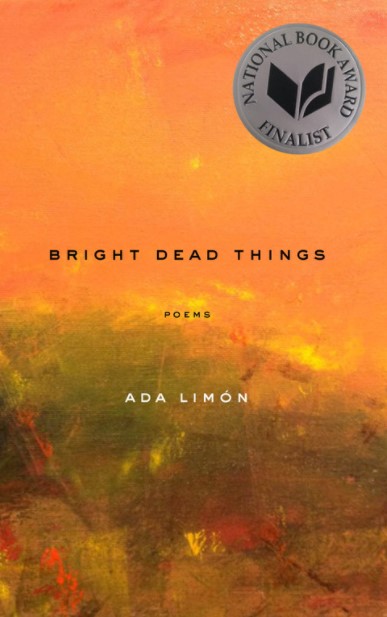
Dave Seter’s review of “Bright Dead Things” by Ada Limón:
In life’s trajectory from childhood story hour to adult happy hour, good storytellers are in demand.
While some theories of poetry argue for silencing the “I” of authorship, Ada Limón’s brand of poetry is personal and emotionally honest.
If a mere book of poetry can invite the reader into the kitchen for coffee and a story, Limón’s new collection Bright Dead Things does just that.
Bright Dead Things explores the duality of joy and suffering. The phrase “bright dead things” comes from the collection’s poem “I Remember the Carrots.”
Limón writes: “When I was a kid, I was excited about carrots, / their spidery neon tops in the garden’s plot.”
The child, wanting to possess this beauty, rips out the immature crop and is scolded by her father.
The poem expresses regret but also resistance to a life of passivity.
Right out of the gate, the collection’s first poem “How to Triumph like a Girl” argues for the unbridled expression of the human spirit. The poem prefers the musculature of horses over manes braided with flowers:
I like their lady horse swagger,
after winning. Ears up, girls, ears up!
But mainly, let’s be honest, I like
that they’re ladies. As if this big
dangerous animal is also a part of me…
There’s a trajectory to life expressed in the collection: from a semi-rural childhood home in Northern California; to New York City; to the poet’s adopted rural environs of Kentucky. While elsewhere carrots are uprooted, the poem “Someplace like Montana” conveys the emotional toll of human uprooting through a bar conversation set in Brooklyn:
… we both talked about
moving to someplace like Montana
and how sometimes it would be nice
to see more sky than just this little square
between the bridges and buildings,
but then we’d miss Brooklyn, and each other,
and we ordered another beer.
The advantage of the “I” of authorship is that it allows a personal touch absent in a more clinical brand of poetry. Storytelling defines people. And sometimes story expands the scope of personhood by adding a dash of mythology. An example of this is found in Limón’s poem “The Great Blue Heron of Dunbar Road.” The poem describes a ritual of daughter and stepfather who delight in seeing a blue heron while driving past a local pond to such an extent they’re disappointed on occasions when it’s not there. They begin to lie to one another to fill this need for communion:
That’s the real truth. What we told each other
to help us through the day: the great blue heron
was there, even when the pond dried up,
or froze over; it was there because it had to be.
For readers who allow themselves to be invited into a world of herons, horses, Kentucky bluegrass, and yes, even kitchens, Ada Limón’s Bright Dead Things offers a world where the coffee’s hella strong and, yes, some beer may even get spilled. But the reward is a sense that friendship may still happen between reader and book, and that poetry need not be about the distances between us.
Ada Limón is the author of The Hurting Kind, as well as five other collections of poems. Limón’s work has appeared in the New Yorker, the New York Times, and American Poetry Review, among others.
She is the new host of American Public Media’s weekday poetry podcast The Slowdown. Born and raised in California, she now lives in Lexington, Kentucky.
Educated as a civil engineer, Dave Seter writes about social and environmental issues, including the intersection of the built world and natural world.
#amwriting #justwrite #poetry #poets #creativewriting